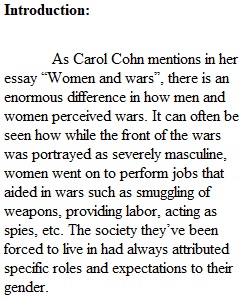


Q The short response paper should be an 800-1000 word essay in MLA format, with a clear thesis argument, introduction, supporting body paragraphs and a conclusion. You do not need to do any outside research; the idea is to react to our readings so far and draw on those readings to support your argument. Bear in mind that this is an academic writing assignment, and so it requires a more academic tone than discussion board does. For example, it is not really appropriate to use personal experiences as anecdotal evidence, as you might in discussion board. You should be using textual support as much as possible to support the claims you are making about the course's readings and issues. Talk to me if you have questions about any this. Short Response Paper Question: Thinking back to our Cohn article from the first week, how do you see gender at work as a ‘structural power relation’ in the articles and/or memoir we’ve read so far in the course? To what degree is it true that “it is not a woman’s biology that is the principal shaper of her experiences of war, but the gender arrangements within which she lives?” In what ways were women’s choices affected during the Holocaust by the ‘set of differences’ which society has constructed between men and women? Or in what ways did women defy the roles and assumptions society had placed upon women?
View Related Questions